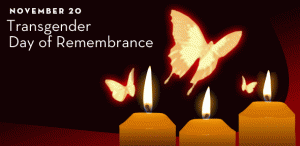Remembering the Past, Living the Future: Transgender Day of Remembrance

Today marks the International Transgender Day of Remembrance, a day created to memorialize those lost to anti-transgender hate or prejudice. Memorial services are happening around the globe, and if you visit the Transgender Day of Remembrance (TDOR) website, many locations are listed. Also listed on the site are names of those who lost their lives to violence. At the time of this writing, eighty-one people were listed; the last name on the list was from November 10, 2014 in Nashville, Tennessee.
TDOR’s site lists verified accounts of anti-transgender violence that resulted in death. Those who were lost to domestic violence and suicide are not included, and those whose murders have gone unreported are not included. Those eighty-one stories have found their way to the site through any number of ways, one of which is through the work of the site’s volunteer, Marti Abernathey. Being able to view the list on the TDOR website through a Google document that is open for viewing but closed for editing (except by Marti) was particularly sobering. While I viewed the list, I could also see six others viewing the document, including Marti. Seeing the document being worked on right before my eyes made the names on the list and the stories they represented more real. There are people working right now to remember those lost to hate.
As humanists, memory and legacy are the ways that we live on after we die. In this light, the Transgender Day of Remembrance reflects our humanist values and beliefs. I don’t know the religious affiliation of those organizing the memorials services nor do I know those who lost their lives. It seems clear to me, however, that the acts of remembering those lost and raising awareness of those who are killed because of ignorance and prejudice are humanist at their core.
Following my thoughts of the humanist themes of Transgender Day of Remembrance, I came to one of the aspirations of First Unitarian Society of Minneapolis, my humanist and Unitarian Universalist community where I work and live: “Support one another’s journey toward meaning and connection in the here and now.” These words inspired me to find out more than simply how transgender people are remembered. I wanted to find out how transgender people are living that journey toward meaning and connection.
One way is to create spaces for transgender people in loving relationships while transitioning, like the organization called Couples in Transition. As I spoke with one of the founders of the organization, a fellow humanist, I learned about the unique story of committed couples where one partner is transitioning and the other is not.
Many of those transitioning are able to access individual services such as medical, psychological, and support groups, but there is almost nothing that takes into account the unique challenges that a transition brings to a committed relationship. That is what Couples in Transition is working to change—their time is spent listening to the non-transitioning partner’s journey as well as focusing on the relationship. The ability of a group of couples to share what is happening week-to-week as both people experience changes in identity has been healing for the participants. For that organization’s co-founder, having a worldview and community that not only accepts or tolerates her, but instead expects her to live who she is fully has been a source of joy through transition.
This is what I would like to leave our readers with. Our message of humanism is not only freeing. It calls us to both remember and hopefully learn from those who have come before us. Humanism also calls us to live joyfully as our authentic selves. This can be a life-saving worldview as well as one that can change the world.
